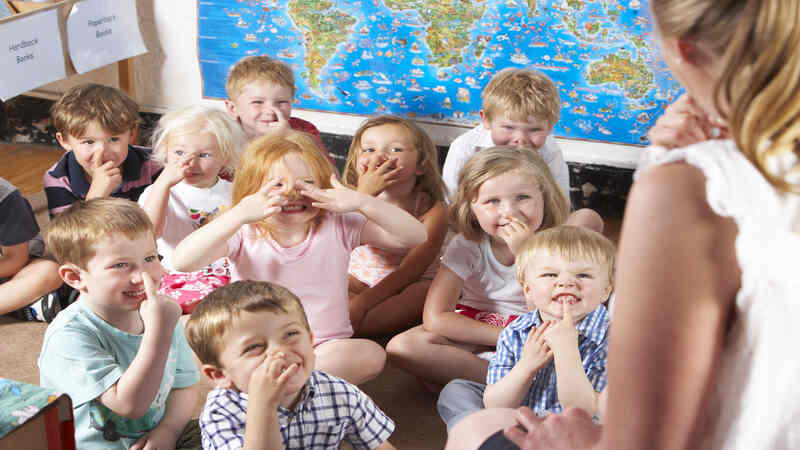
There has always been confusion between Kindergarten and Montessori styles of learning. Parents are always in a dilemma while choosing between the two. And why shouldn’t you be worried? After all, it’s a question about the future of your child, right? This is exactly why we decided to give you a detailed explanation. On the two styles or rather methods of learning and education so that your worries can be gone for good!
In This Article
Key Differences Between Montessori And Kindergarten Style of Learning
Kindergarten and Montessori focus on providing fundamental education before children start their schooling. Though they focus on the same, their method of imparting education is different. Here we have listed the key difference between Montessori And Kindergarten Style Of Learning :
1. The Basic Differences Between Montessori And Kindergarten
To get things cleared in one go, you should note that Kindergarten is a method of education used by the majority of schools. On the other hand, Montessori is a method of instruction that is used to educate. So, Kindergarten is the education, while Montessori is the approach or method to educate.
Kindergarten is a part of education and is found in most schools, whereas Montessori is the way of education that may or may not be present or be used in the school.
2.Differences Between Montessori And Kindergarten in Structure of Education
Kindergarten is a more structured education system where the role of a teacher is pre-defined and they follow the same technique for all students.
On the contrary, the Montessori style uses a fluid/unstructured approach where each student is allowed to express themselves and the teacher adapts to the students’ style in order to impart knowledge.

3. Age of Student
The kindergarten style of learning is designed for children between the ages of three to five, which forms the base of their primary education.
Montessori style is basically for children up to the age of six years, after which it becomes optional. Studies have proved the Montessori approach to be beneficial even for teenagers.
4. Teacher’s Role
In a Kindergarten style education system, the teacher forms the crux. They are responsible for deciding the methods of teaching and imparting knowledge. They decide what, how, and when the students learn about a topic or skills, all in one go.
On the other hand, Montessori teachers have a very limited role because they do not decide how or what the children learn. They simply introduce a topic to a student and let the child explore the various possible outcomes for that particular topic or problem. Here, children from the crux and learn through their own experiences and teachers guide them.
5. Parent’s Role
In the Kindergarten style of learning, the role of teacher and parents is the same. The parents have to adopt similar methods of educating their children at home. The learning criterion remains the same in both places and parents have to adopt the same techniques.
In the Montessori style of learning, parents have minimal roles. They have to let the children explore and express their creativity and learn through experimentation even at home.
6. Differences Between Montessori And Kindergarten with Respect to the Learning Pace
In a Kindergarten set up, the child is expected to learn at a similar pace as the other students or they are considered to fall behind or lag in skills.
In a Montessori style setup, the children are allowed to learn at their own pace and time to learn each skill. Hence, the pressure to perform remains lesser in the Montessori setup of learning.
7. Classroom Environment
Traditional Kindergarten style classes are designed keeping the teacher in mind as the focus. Whereas the Montessori classrooms are designed after child behavior observations and keeping the child as the main focus. This allows individual and focused learning.
8. Active or Passive
Kindergarten style makes learning passive and more orated to the children because of a predefined and structured syllabus. This requires children to memorize and take assignments or tests.
Montessori style adopts an active approach where lessons are more “hands-on” with real experiences and students discover for themselves.
9. Self-Esteem
Montessori style of learning advocates the value of self-esteem and understands that it comes from a feeling of self-pride because of a child’s achievements. Kindergarten style understands that self-esteem comes from external assessment and judgment.
10. Love for learning
Kindergarten style of learning believes in standardized test performance and grading system. Whereas the Montessori style of learning is designed to appeal to the child’s inner quest for knowledge, and the will to learn which makes children love learning.
There are various differences between the two styles of learning and both have their own pros and cons. As parents, we have to decide which one is correct for the child. You need to carefully observe your child and his/her requirements to decide on one of these. This is because each child is different. And while one is perfect for Kindergarten, the other would be outstanding for Montessori, simply because children learn differently and respond differently. However, this does not mean you get paranoid and start fretting over the issue of education!
FAQ’s
1. What Type of Child is Best For Montessori?
Although Montessori is good for all kids, but kids with special needs (having physical or learning disabilities) thrive well in a Montessori set up.
2. What Age is Montessori Baby For?
Montessori programs in the Early Childhood level usually cater to children between 2.5 to 6 years of age. But, there are also programs for infants and toddlers as well i.e., from birth till 3 years of age.
Read also:
How Right is the Right Brain Education for Kids?
20 Tips To Help Your Child Crack The First School Interview
